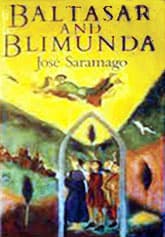Baltasar and Blimunda
CRITIQUE | THE TEXT
 First U.K. edition
First U.K. editionOriginal title
Memorial do Convento
First publication
1982
Literature form
Novel
Genres
Literary, fantasy
Writing language
Portuguese
Author's country
Portugal
Length
Approx. 147,000 words
Returning to earth
The title in English of José Saramago's most acclaimed novel, Baltasar and Blimunda, gives the impression it's a love story, about the love between the soldier who has lost a hand in battle and the girl who has been orphaned by the Inquisition. This may confuse some readers once they wade into the pageantry of political leaders, the scheming of religious leaders, and the suffering experienced by the people.
Yet, despite such dark material, eighteenth-century Portugal is quite a bright and fantastic world as recreated by Saramago. "After all, this is a fairy tale," the novel's unknown narrator says at one point.
The title in the author's native tongue, translated literally as Memorial of the Convent, indicates a less romantic theme, although it might mislead others who don't know Saramago into thinking it's a religiously inspiring novel.
The Convent of Mafra, an actual and still existing site in Portugal, is something of a MacGuffin in the novel. Its promised founding serves as a motivation—for God presumably—to give the king a son. Much of the plot involves preparations to construct the convent, employing fifty thousand dragooned peasants, including a painfully detailed and exhaustingly brutal effort to bring a needed, huge stone to Mafra, leaving a trail of bloodshed behind it. But of little or no importance to the writer is the convent itself. Its value is only as a political statement, a symbol perhaps of an outdated approach to finding escape from the misery of life on earth.
Fleeing the Inquisition
Another more scientific approach, the invention of a flying ship by the heretical priest Bartolomeu Lourenco (also an historical figure), helped by Baltasar and Blimunda, conversely is ahead if its time. For one thing the only fuel available to it is human wills, captured by Blimunda's powers of insight into people. Even so, in one of those passages of magic realism that lift the generally down-to-earth account, the airship successfully flies our protagonists above the ground. But the invention is eventually abandoned as its inventor flees the Inquisition.
In the end, it turns out the only escape, at least for the titular characters, is in their connection to each other, defeating even death it appears. This is a love story.
It is also a political story. Saramago misses no opportunity to point out the vast chasm between the lifestyle of the rulers and the people, and how the populace are manipulated to be complicit in their own oppression. He does this without much preaching, but via surprised remarks by the naïve narrator, and by the accumulation of observed details.
Sometimes this latter is tiring. Especially in the beginning chapters, the countless trivial details about the lives of royalty and clerics, relics of the medieval era, and their seemingly endless processions and pageantry, make for dull reading. Even more so when presented in Saramago's patented style of run-on sentences.
This seems to be a minority criticism, however, as most critics argue that his propensity for rich description and unorthodox punctuation heighten the oppressive effect Saramago intends.
Left hand of darkness
As mentioned, the novel Baltasar and Blimunda is lighter and flies above the heaviness of the social oppression depicted just as the characters Baltasar, Blimunda and Bartolomeu soar above the earth. Saramago's humour helps. It comes across not as jokes but in fanciful reasoning by the characters. For example, the renegade priest tries to comfort Baltasar for having lost his left hand by noting he is emulating the deity in this:
No one ever said so, nor has it ever been written, only I say that God's left hand is missing, because it is on His right, at His right hand, that the chosen sit, nor do you find any reference to God's left hand either in the Holy Scriptures or in the writings of the holy doctors of the Church, no one sits at God's left hand, for it is a void, a nothingness, an absence, therefore God is one-handed. The priest gave a deep sigh and concluded, He has no left hand.
The narrator, possibly Saramago, counters this argument with an aside pointing out scripture refers to God's hands (multiple). To which I would counter-argue this could refer to multiple right hands, making God into a kind of lopsided octopus. Though Saramago never gets that silly.
Even with the light-hearted leavening, however, I find Baltasar and Blimunda's place as the most admired of Saramago's works somewhat puzzling. Despite brilliant characters and a genuine story told with great bravado, the novel is still dense and hard going. The suspicion is raised that the historical backdrop, the well-researched detail and the stylish majesty of the thick prose tend to create the impression this is a greater literary accomplishment than the author's other, more entertaining diversions.
But for anyone looking for something to read that's completely different from anything else they've ever read and will leave them pondering the meaning of it all, this novel is well worth cracking open. Of course, this can be said of almost anything Saramago has written. With every outing he explores new territory and new ways of exploring it. Baltasar and Blimunda is one of the most extraordinary instances of this.
Judging by other reactions online, I expect it will either move you to tears or leave you cold. I'm somewhere in-between.
— Eric
CRITIQUE | THE TEXT


